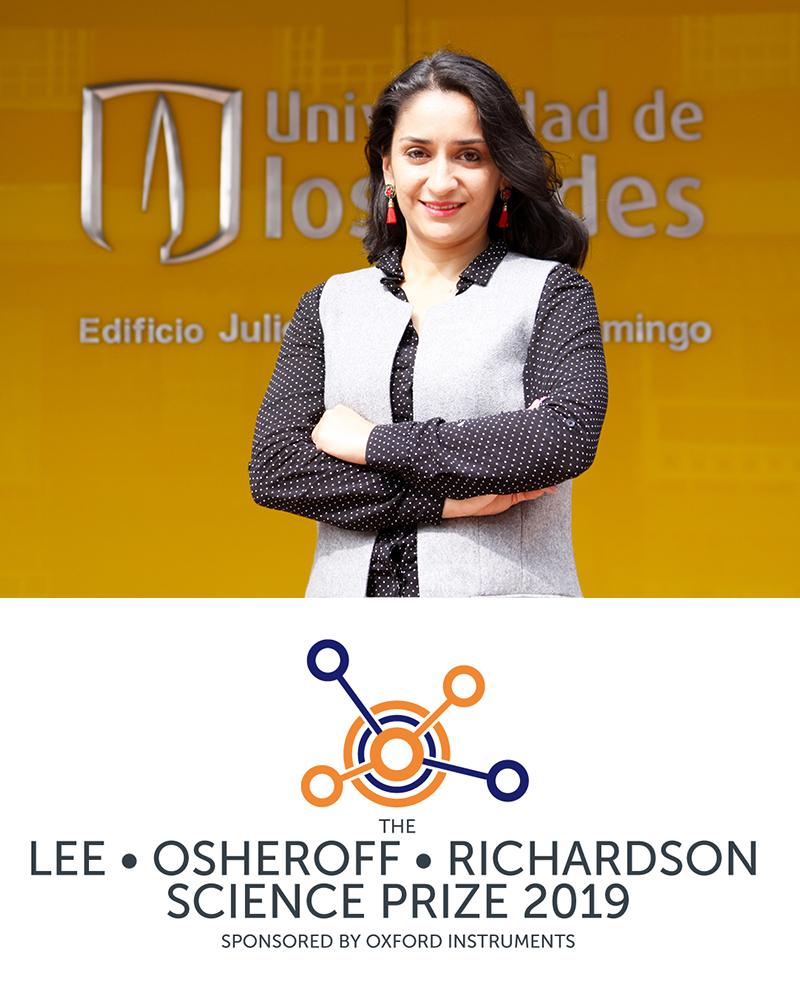5 Feb
Oxford Instruments announces Dr Paula Giraldo-Gallo as the winner of the 2019 Lee Osheroff Richardson Science Prize for Americas
Oxford Instruments is delighted to announce that Dr Paula Giraldo-Gallo of Universidad de Los Andes, Colombia, South America has been selected as the winner of the 2019 Lee Osheroff Richardson (LOR) Science Prize for North and South America.
Dr Giraldo-Gallo is recognised for her contributions to the understanding of a variety of novel superconductors – ranging from low-carrier-density semiconductors to the cuprates, with a special focus on magneto-transport measurements in ultra-high magnetic fields to characterise the normal state of such superconductors, the state from which superconductivity originates.
"It truly is an honour to be the recipient of the Lee Osheroff Richardson Science Prize this year. I receive it as a recognition of the hard work of a team of talented and remarkable scientists that have walked with me along this fun path of understanding novel ground states of quantum materials. I dedicate this prize to my mentors and collaborators throughout these years", commented Dr Giraldo-Gallo.
As a graduate student, Giraldo‐Gallo studied (Ba,Pb)BiO3, a material that has been around for more than 40 years, yet remained interesting due to the many unanswered questions regarding the mechanism of superconductivity, the shape of the superconducting dome versus lead doping, and the relationship of the superconducting phase with a charge density wave phase. Giraldo‐Gallo discovered the microscopic details of a structural phase separation in this system that determines the macroscopic observations, including the macroscopic superconducting transition temperature (Tc), implying that (Ba,Pb)BiO3 has the potential of being a superconductor with a much higher Tc, possibly three times higher, similar to the related compound (Ba,K)BiO3. Dr Giraldo‐Gallo’s work on (Ba,Pb)BiO3 represents a remarkable advancement in our knowledge of this important superconductor. As a result, there has been a renewed and increasing interest in bismuthate superconductors to understand the relationship between superconductivity and charge density wave states.
After her PhD, Dr Giraldo‐Gallo applied for the most prestigious Jack E. Crow Postdoctoral Fellowship at the National High Magnetic Field Laboratory (NHMFL) and was unanimously chosen by the selection committee.
As a postdoctoral researcher, Dr Giraldo‐Gallo established herself as an fully independent researcher through her work on the high‐temperature superconducting compound, (La,Sr)2CuO4. She was an independent agent in the laboratory, developing next generation magneto‐transport techniques for use in the extremely challenging environment of pulsed magnets. Dr Giraldo‐Gallo’s improved techniques for pulsed magnetic fields provided the signal‐to‐noise, necessary to establish the surprising and striking fact that optimally‐doped (La,Sr)2CuO4 exhibits a linear magnetoresistance as well. This result has captured the imagination of superconducting theorists, as it suggests an additional critical behaviour in optimally‐doped cuprates that is both phenomenologically simple, yet difficult to incorporate into present theoretical scenarios that seek to explain the physics of high‐temperature superconductors.
Dr Giraldo‐Gallo is currently working on understanding the relation between quantum criticality, charge order and superconductivity in a variety of compounds, including the K‐doped bismuthate compound (Ba,K)BiO3, and some transition metal chalcogenides. For this, she has set up systems for single crystal growth from molten solutions, by electrochemical methods, and by physical vapor transport at the Universidad de Los Andes. She has already produced high‐quality single crystals on which she is performing transport, magnetic, X-ray diffraction and other microscopy characterisation measurements.
The LOR Science Prize selection committee was very pleased to recognise Dr Giraldo‐Gallo’s deep insights into condensed matter physics and her ability to decide which experiments are most important to advance our understanding of superconductivity. The committee consists of leading American physicists and is chaired by Professor Bruce Gaulin of Mc Master University, Hamilton, ON, Canada.
Dr Giraldo-Gallo will be presented with the trophy, certificate and the $8000 cash prize at the Oxford Instruments’ special event – “Socialize with Science” during the 2019 APS March Meeting in Boston, MA, USA on 6 March evening.
The objective of the Lee Osheroff Richardson Science Prize is to promote and recognise the novel work of young scientists working in the fields of low temperatures and/or high magnetic fields or surface science in North and South America. Oxford Instruments is aware that there is a critical and often difficult stage for many between completing a PhD and gaining a permanent research position. The company has therefore been helping individuals who are producing innovative work by offering assistance both financially and suitably promoting their research work, through sponsoring the LOR Science Prize for North and South America for 14 years now. The Prize is named in honour of Professors David M. Lee, Douglas D. Osheroff and the late Robert C. Richardson, joint recipients of The Nobel Prize in Physics 1996 for their discovery of ‘superfluidity in helium-3’.
The previous winners of the LOR Science Prize are Dr Kate Ross, Dr Brad Ramshaw, Dr Mohamad Hamidian, Dr Cory Dean, Dr Chiara Tarantini, Dr Lu Li, Dr Kenneth Burch, Dr Jing Xia, Dr Vivien Zapf, Dr Eunseong Kim, Dr Suchitra Sebastian, Dr Jason Petta and Dr Christian Lupien.


